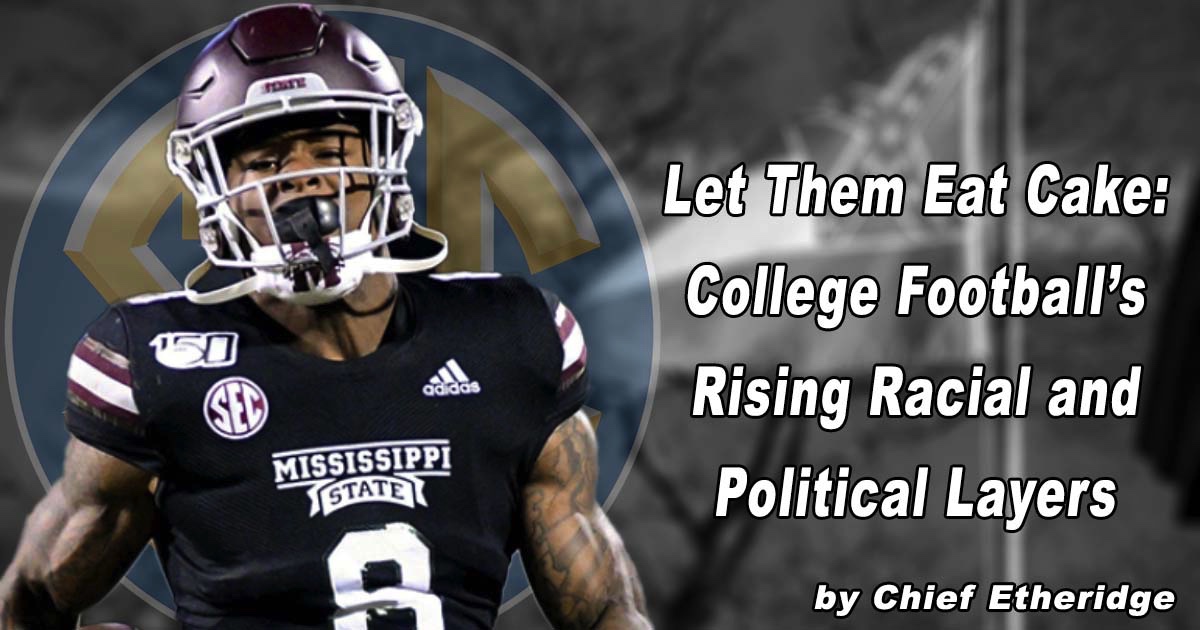Let Them Eat Cake: College Football’s Rising Racial and Political Layers

by Chief Etheridge
Everybody likes cake.
There are all kinds: marble, ice cream, birthday, wedding, cake by the ocean, the list goes on and everyone has their personal favorite. What you probably like most about cake is the final product – the icing, the richly baked bread on the inside, the cornucopia of sweet flavors.
But we all know there is a process to making cake. Butter, flour, baking powder, eggs, etc., you know the drill, are mixed together to create the delicious dessert that you would much rather eat than help make. When you see cake, you simply want to dive right in rather than think about what went in to making it.
Many people indulge in sports like a cake. Some enjoy sports because they are seemingly straightforward – athletes go out, play a game with an established goal, they win or lose (or tie), “it’s on to Cincinnati,” repeat.
For others, sports are used as an escape to past athletic achievements and participation; a distraction from trying times or obstacles going on in life; or maybe a disruption to the monotony of the work week. While we are all guilty of viewing sports through a simplistic lens or using them as a means of escape at one point or another, in doing so we ignore the underlying social, cultural, and political complexities of the games we are watching. To acknowledge these complexities is to leave the escape, to pay more attention to the ingredients and layers than to simply enjoying the cake.
Change in Sports
A lot has changed in the past month. You have undoubtedly noticed it, primarily through protests across the country. In any other year, many people would turn to sports in the same way they typically have: as an escape. It’s why a media leader like Jimmy Pitaro, President of ESPN, has been tasked with responding to public opinion by making the worldwide leader less of a platform for politics, and more of a haven for strictly sports.
But in the past few weeks, it seems that topics of politics and race, subjects that are fundamental to social, cultural, and political conversations, have become more intertwined with sports by the day. The fact that sports are currently on hold is likely one reason many athletes have acted on their frustrations and joined social movements taking place outside their front door. Due to this development, we are seeing a change in the conversation on race and politics in sports across the board, from NASCAR, to the WNBA and NBA, and even in college football.

College Football
Mississippi
Kylin Hill, a running back for Mississippi State University (MSU), recently said that he will not play this year unless the state of Mississippi removes the Confederate battle emblem from its state flag.
On top of that, Ole Miss head football coach Lane Kiffin and MSU head football coach Mike Leach appeared before the state legislature to lobby for the change. As of June 29th, the Mississippi legislature passed a bill, that is in the process of being sent to the governor, to remove the emblem.
Oklahoma State
Chuba Hubbard, Oklahoma State University’s (OSU) running back and the 2019 BIG 12 Offensive Player of the Year, recently called out head coach Mike Gundy for wearing a shirt bearing the logo for One America News Network, a far-right cable channel.
In a matter of hours, OSU released a video featuring Hubbard and Gundy, with Gundy saying he is “looking forward to making some changes” after speaking with his players about how it affected them and what his shirt represented to them.
If you are reading this, I’m guessing you are a college football fan in some shape or form, so you probably know about some of the other instances of race and college football converging this past month as well, such as Iowa and Clemson.
Not even college football can avoid intersecting with the current social, cultural, and political issues facing this country. In a just a few weeks, these issues have been pushed to the forefront of college football through the actions and words of players around the country and conversations like these could be around for a long time.
As these players become empowered to speak up on topics such as race, viewing college football through the simplistic “win or go home” lens or trying to use the sport as a means of escapism could become more difficult. What we see being discussed in the news may very well be the same conversations players are having in the locker room, on campus, or in post-game interviews on ESPN. Maybe a domino effect will be created, wherein this generation of college football players changes the landscape of the sport and influences the next generation to do the same with their platform.
Only time will tell whether college football players continue to be empowered and express their opinions on social, cultural, and political matters. I cannot tell you what the future holds, and maybe if football somehow starts by the end of this year things might return to how they were in the past.
But what I can tell you is, right now, this is how college football players are choosing to use their platform and at the very least it’s worth listening to what they are saying. You may not like or agree with what they say or do, but it doesn’t cost anything to listen and, who knows, you may even learn something.
And if you really don’t like what they are saying or doing, just turn off the TV, log off Twitter, and eat some cake. Everybody likes cake.

“Sports are predicated on a commitment to something larger than ourselves, whether a striving team, a civic identity, or the simple magic of shared experience.” –Rob Mahoney, The Ringer
Featured in Forbes, Chief was born in Atlanta, Georgia and raised in Charlotte, North Carolina. A proud Wofford graduate, Chief currently lives in Washington, D.C and is pursuing a master’s degree at George Washington University and working for the U.S. Chamber of Commerce. A fan of all things sports, from darts to driving, he appreciates the simple magic of shared experience that sports can bring to people’s lives.
 Front Porch Football
Front Porch Football

